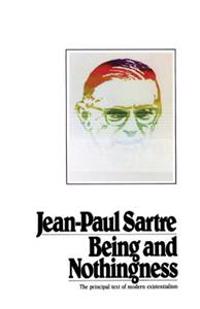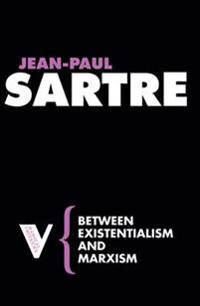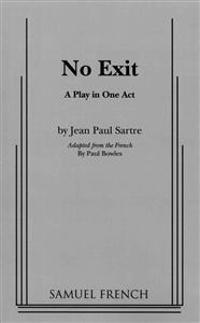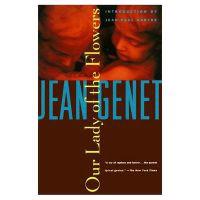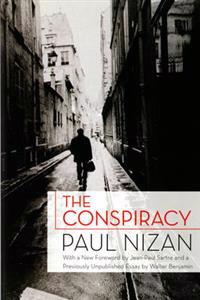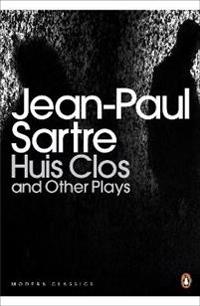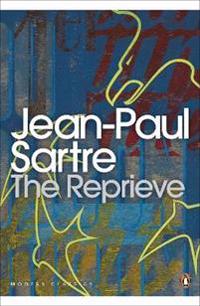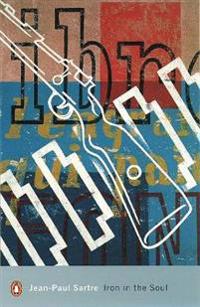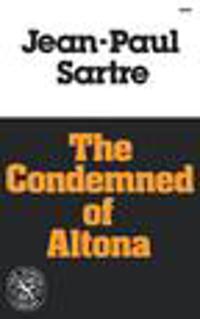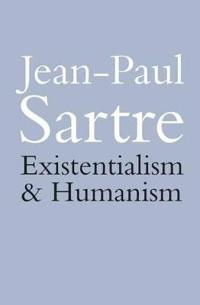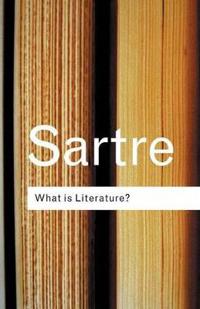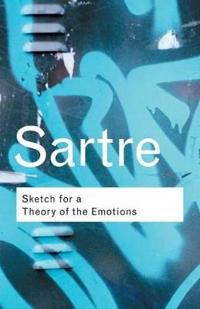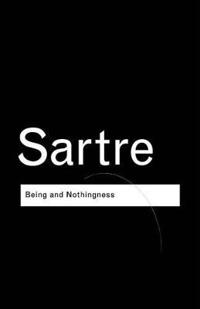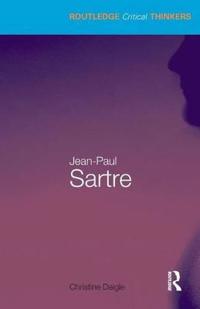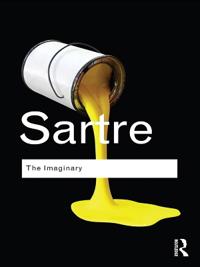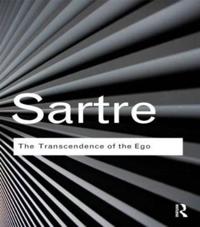Jean-paul Sartre (Pocket)
avJean-paul Sartre
ISBN: 9780415213684 - UTGIVEN: 2000-11-23This is the first collection of Sartre's key philosophical writings and provides an indispensable resource for all students and readers of his work, which has been influential in philosophy, literature and politics.[...]
Being and Nothingness (Pocket)
avJean-Paul Sartre, Hazel E. Barnes, Jean-Paul Sartre
ISBN: 9780671867805 - UTGIVEN: 199308IN
Between Existentialism and Marxism (Pocket)
avJean-Paul Sartre, John (TRN) Matthews, Jean-Paul Sartre
ISBN: 9781844672073 - UTGIVEN: 2008-01This book presents a full decade of Sartre's work, from the publication of the "Critique of Dialectical Reason" in 1960, the basic philosophical turning-point in his postwar development, to the inception of his major study on Flaubert, the first volumes of which appeared in 1971. The essays and inte[...]
No Exit (Häftad)
avJean-Paul Sarte, Jean-Paul Sartre, Paul Bowles
ISBN: 9780573613050 - UTGIVEN: 2010-12Our Lady of the Flowers (Pocket)
avJean Genet, Jean-Paul Sartre, Jean Genet
ISBN: 9780802130136 - UTGIVEN: 198808Jean Genet's first, and arguably greatest, novel was written while he was in prison. As Sartre recounts in his introduction, Genet penned this work on the brown paper which inmates were supposed to use to fold bags as a form of occupational therapy. The masterpiece he managed to produce under those [...]
The Conspiracy (Häftad)
avPaul Nizan, Jean-Paul Sartre, Walter Benjamin
ISBN: 9781844677689 - UTGIVEN: 201111The Conspiracy, winner of the Prix Interallie in 1938, was Paul Nizan's last novel and was hailed by Jean-Paul Sartre as his masterpiece. It is centered upon the figure of Bertrand Rosenthal, philosophy student at the Ecole Normale, would-be revolutionary and scion of a haut-bourgeois Jewish family.[...]
Tete-A-Tete: The Tumultuous Lives and Loves of Simone de Beauvoir and Jean-Paul Sartre (Häftad)
avHazel Rowley
ISBN: 9780060520601 - UTGIVEN: 2006-10An intimate dual portrait discusses Sartre and de Beauvoir's Existentialist philosophies, their notorious open union, and the controversy surrounding their relationship that has endured throughout the past twenty-five years. Reader's Guide available. Reprint. 20,000 first printing.[...]
Huis Clos and Other Plays (Storpocket)
avJean-Paul Sartre
ISBN: 9780141184555 - UTGIVEN: 2000-08These three plays, diverse in subject but thematically coherent, illuminate one of Sartre's major philosophical concerns: the struggle to live and act freely in a complex and constricting world. "Lucifer and the Lord", Sartre's favourite among his plays, explores this theme in depth, dealing in the [...]
Nausea (Storpocket)
avJean-Paul Sartre
ISBN: 9780141185491 - UTGIVEN: 200011Jean-Paul Sartre's first published novel, "Nausea" is both an extended essay on existentialist ideals, and a profound fictional exploration of a man struggling to restore a sense of meaning to his life. This "Penguin Modern Classics" edition is translated from the French by Robert Baldick with an in[...]
The Reprieve (Storpocket)
avJean-Paul Sartre
ISBN: 9780141185781 - UTGIVEN: 2001-05It is September 1938 and during a heatwave, Europe tensely awaits the outcome of the Munich conference, where they will learn if there is to be a war. In Paris, people are waiting too, among them Mathieu, Jacques and Philippe, each wrestling with their own love affairs, doubts and angsts - and none [...]
Iron in the Soul (Storpocket)
avJean-Paul Sartre
ISBN: 9780141186573 - UTGIVEN: 2002-09June 1940 was the summer of defeat for the French soldiers, deserted by their officers, utterly demoralized, awaiting the Armistice. Day by day, hour by hour, "Iron in the Soul" unfolds what men thought and felt and did as France fell. Men who shrugged, men who ran, men who fought and tragic men lik[...]
A Commentary on Jean-Paul Sartre's "Being and Nothingness" (Pocket)
avJoseph S. Catalano
ISBN: 9780226096995 - UTGIVEN: 1985-09-15Existentialism Is a Humanism (Häftad)
avJean-Paul Sartre, John Kulka
ISBN: 9780300115468 - UTGIVEN: 200707This book presents a new English translation of two seminal works by Jean-Paul Sartre, the most dominant European intellectual of the post-World War II decades. The volume includes Sartre's 1945 lecture "Existentialism Is a Humanism" and his analysis of Camus's "The Stranger," along with a discussio[...]
Existentialism and Humanism (Häftad)
avJean-Paul Sartre
ISBN: 9780413776396 - UTGIVEN: 200709Originally delivered as a lecture in Paris in 1945, 'Existentialism and Humanism' is Sartre's seminal defence of his original doctrine of existentialism and a plan for its practical application to everyday human life.[...]
Les Mains Sales (Häftad)
avJean-Paul Sartre
ISBN: 9780415039352 - UTGIVEN: 1985-08Includes the full French text, accompanied by French-English vocabulary. Notes and a detailed introduction in English put the work in its social and historical context.[...]
Huis Clos (Pocket)
avJean-paul Sartre
ISBN: 9780415040037 - UTGIVEN: 1987-12-03Includes the full French text, accompanied by French-English vocabulary. Notes and a detailed introduction in English put the work in its social and historical context.[...]
What is Literature? (Häftad)
avJean-Paul Sartre
ISBN: 9780415254045 - UTGIVEN: 200105Jean-Paul Sartre was one of the most important philosophical and political thinkers of the twentieth century. His writings had a potency that was irresistible to the intellectual scene that swept post-war Europe, and have left a vital inheritance to contemporary thought. The central tenet of the Exi[...]
Sketch for a Theory of the Emotions (Häftad)
avJean-Paul Sartre
ISBN: 9780415267526 - UTGIVEN: 200110Although written fairly early in his career, in 1939, Sketch for a Theory of the Emotions is considered to be one of Jean-Paul Sartre's most important pieces of writing. It not only anticipates but argues many of the ideas to be found in his famous Being and Nothingness. By subjecting the emotion th[...]
Being and Nothingness (Häftad)
avJean-Paul Sartre
ISBN: 9780415278485 - UTGIVEN: 200308Being and Nothingness is without doubt one of the most significant books of the twentieth century. The central work by one of the world's most influential thinkers, it altered the course of western philosophy. Its revolutionary approach challenged all previous assumptions about the individual's rela[...]
Colonialism and Neocolonialism (Övrig)
avJean-Paul Sartre
ISBN: 9780415378468 - UTGIVEN: 2006-02-01Nearly forty years after its first publication in French, this collection of Sartre's writings on colonialism remains a supremely powerful, and relevant, polemical work. Over a series of thirteen essays, Sartre brings the full force of his remarkable intellect relentlessly to bear on his own country[...]
Jean-Paul Sartre (Storpocket)
avChristine Daigle
ISBN: 9780415435659 - UTGIVEN: 200910As the founding figure of the movement known as 'existentialism', Jean-Paul Sartre was a key figure in twentieth-century literature and philosophy, whose writings changed the course of critical thought. Christine Daigle sets Sartre's thought in context, and considers a number of key ideas in detail,[...]
The Imaginary (Storpocket)
avJean-Paul Sartre
ISBN: 9780415567848 - UTGIVEN: 201003A cornerstone of Sartre's philosophy, "The Imaginary" was first published in 1940. Sartre had become acquainted with the philosophy of Edmund Husserl in Berlin and was fascinated by his idea of the 'intentionality of consciousness' as a key to the puzzle of existence. Against this background, "The I[...]
The Transcendence of the Ego (Storpocket)
avJean-Paul Sartre
ISBN: 9780415610179 - UTGIVEN: 201103'I should like to show here that the Ego is neither formally or materially in consciousness: it is outside, in the world.' Jean-Paul Sartre The Transcendence of the Ego is one of Jean-Paul Sartre's earliest philosophical publications and essential for understanding the trajectory of his work as a [...]


